

Jeremy Grantham on Our Debt Solution (Charlie Rose) When have econ blogs changed your mind about something? Detroit! Detroit!
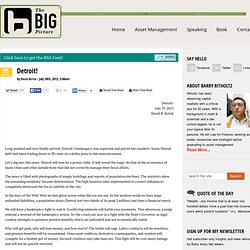
July 19, 2013 David R. 8 Stark Realities of America's Dysfunctional New Economy. July 18, 2013 | There’s a new normal in the American economy for vast slices of society and it’s discouragingly tough, despite all the cheerleading from the White House and economists that the country is in a slow but steady recovery.
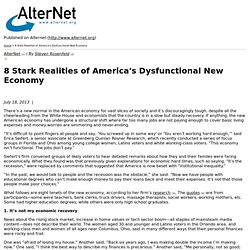
If anything, the new American economy has undergone a structural shift where far too many jobs are not paying enough to cover basic living expenses and money worries are simmering and never-ending. “It’s difficult to point fingers at people and say, 'You screwed up in some way' or 'You aren’t working hard enough,’” said Erica Seifert, a senior associate at Greenberg Quinlan Rosner Research, which recently conducted a series of focus groups in Florida and Ohio among young college women, Latino voters and white working-class voters. “This economy isn’t functional. The jobs don’t pay.” Introducing the Global Power Project. We live in an interdependent world, where nations are increasingly eclipsed in size and wealth by the major banks and transnational corporations which have come to dominate the global economy.
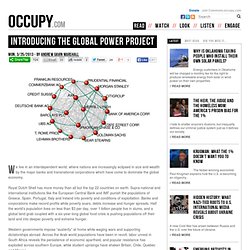
Royal Dutch Shell has more money than all but the top 22 countries on earth. Supra-national and international institutions like the European Central Bank and IMF punish the populations of Greece, Spain, Portugal, Italy and Ireland into poverty and conditions of exploitation. Banks and corporations make record profits while poverty soars, debts increase and hunger spreads. Half the world’s population lives on less than $3 per day, over 1 billion people live in slums, and a global land grab coupled with a six-year-long global food crisis is pushing populations off their land and into deeper poverty and extreme hunger. Why We Don’t Believe In Science. Editors’ Note: Portions of this post appeared in similar form in a December, 2009, piece by Jonah Lehrer for Wired magazine.
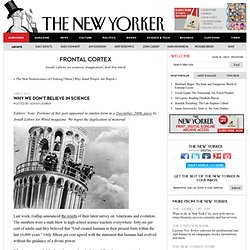
We regret the duplication of material. Last week, Gallup announced the results of their latest survey on Americans and evolution. The numbers were a stark blow to high-school science teachers everywhere: forty-six per cent of adults said they believed that “God created humans in their present form within the last 10,000 years.” Calculated Risk. Hedge Funds Are for Suckers. At the height of the financial crisis in 2008, a group of famous hedge fund managers was made to stand before Congress like thieves in a stockade and defend their existence to an angry public.
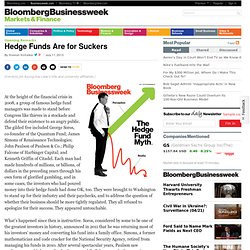
The gilded five included George Soros, co-founder of the Quantum Fund; James Simons of Renaissance Technologies; John Paulson of Paulson & Co.; Philip Falcone of Harbinger Capital; and Kenneth Griffin of Citadel. Each man had made hundreds of millions, or billions, of dollars in the preceding years through his own form of glorified gambling, and in some cases, the investors who had poured money into their hedge funds had done OK, too.
Fed is deeply divided over winding down stimulus program. FX HORIZONS: Move Over Economists; Time to Give Physicists a Turn - MoneyBeat. Bernanke: Economy Still Needs Fed's Stimulus. No, Making Banks Hold More Capital Is Not Going To Wreck Lending Or The Economy. Uh-oh, everybody: Bankers are warning that the U.S. economy could be in deep trouble.
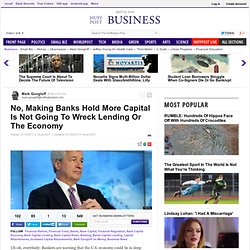
Not because bankers wrecked it again, like that last time, but because we are being mean to bankers. Fortunately, these bankers are probably wrong. Like they do, bank flaks have rushed to warn that the higher bank capital requirements proposed on Tuesday by the Federal Reserve, Office of the Comptroller of the Currency and the Federal Deposit Insurance Corporation will slow down lending and economic growth, make U.S. banks less competitive against European competitors and be cruel to puppies and kittens.
Walmart Living Wage Dispute In D.C. Undermines Company's Murky Pay Claims. WASHINGTON -- On Tuesday, a Walmart executive rebuked the D.C.
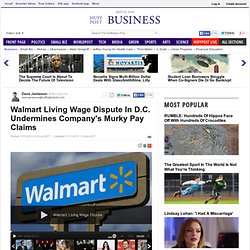
Council in an op-ed in the Washington Post, declaring that the company would scuttle plans for three stores if the city enacted a living-wage law targeted at big-box retailers. The bill, which passed a council vote on Wednesday, would require a $12.50 minimum wage for workers at companies with more than $1 billion in global sales. For those who follow Walmart's labor disputes, that $12.50 living wage seemed quite close to another figure commonly associated with the world's largest retailer: its average store worker wage, as reported by the company. According to Walmart, full-time store workers now earn $12.78 per hour on average, or 28 cents higher than the proposed D.C. mandate. He Foresaw the End of an Era by John Cassidy.
The New Paradigm for Financial Markets: The Credit Crisis of 2008 and What It Means by George Soros PublicAffairs, 162 pp.,$22.95 George Soros has been an active investor for more than half a century.
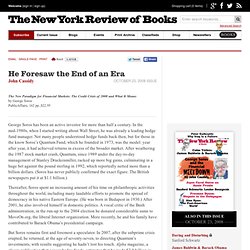
In the mid-1980s, when I started writing about Wall Street, he was already a leading hedge fund manager. Rate increases can actually be bullish - Mark Hulbert. By Mark Hulbert, MarketWatch.
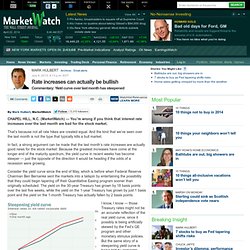
‘Abenomics’ Brings an IPO Flood - MoneyBeat. U.S. Banks Seen Freezing Payouts Under Harsh Leverage Rule. The biggest U.S. banks, after years of building equity, may continue hoarding profits instead of boosting dividends as they face stricter capital rules than foreign competitors.
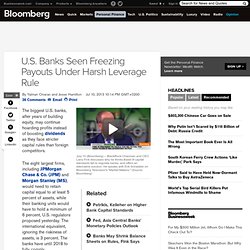
The eight largest firms, including JPMorgan Chase & Co. (JPM) and Morgan Stanley (MS), would need to retain capital equal to at least 5 percent of assets, while their banking units would have to hold a minimum of 6 percent, U.S. regulators proposed yesterday. The international equivalent, ignoring the riskiness of assets, is 3 percent. The banks have until 2018 to fully comply. The U.S. plan goes beyond rules approved by the Basel Committee on Banking Supervision to prevent a repeat of the 2008 crisis, which almost destroyed the financial system. REITs Deepening Bond Losses as Leverage Forces Sales.
Annaly Capital Management Inc. (NLY)’s Wellington Denahan, head of the largest mortgage real-estate investment trust, told investors less than three months ago that reports REITs could threaten U.S. financial stability were as misleading as the media frenzy over shark attacks in 2001. Since the May 2 comments, shares of the companies, which use borrowed money to make $400 billion in credit market bets, dropped about 20 percent and the value of their assets has plunged after the Federal Reserve triggered a flight from bond funds by signaling plans to slow its debt-buying program. REITs may have needed to sell about $30 billion of government-backed mortgage securities in just one week last month to maintain the amount of borrowing relative to their net worth, according to JPMorgan Chase & Co.
He Foresaw the End of an Era by John Cassidy. The New Paradigm for Financial Markets: The Credit Crisis of 2008 and What It Means by George Soros PublicAffairs, 162 pp.,$22.95. He Foresaw the End of an Era by John Cassidy. Economists looked even closer at Reinhart and Rogoff’s data—and the results might surprise you. Economic Inequality Is Not An Accident, It Was Created. Inequality.is. Rethinking for action. This Blog is no longer active! Fearless, Independent News and Opinion. Elizabeth Warren Urges Senate To Confirm Richard Cordray As CFPB Director. Sen. Update: Four Charts to Track Timing for QE3 Tapering. U.S. Derivatives Regulator Weighs Delay in Cross-Border Rule. U.S. Banks Face Two Ratios as FDIC Sets Capital Vote. Capital standards at the biggest U.S. lenders would rise to 5 percent of assets for parent companies and 6 percent for their banking units under a proposal by regulators to bolster financial firms.
Leverage ratios would be pegged 2 percentage points above the 3 percent international minimum for holding companies, the Office of the Comptroller of the Currency said today in a statement. Multiplier Effect. Do the inflationistas really believe what they say? Do the inflationistas really believe what they say? Correlation and Causation. What We Can Learn From America's First Tea Party About Countering Corporate Power. Surviving the New American Economy. Global Power Project, Part 3: The Influence of Individuals and Family Dynasties. Global Power Project, Part 2: Identifying the Institutions of Control. Global Power Project, Part 1: Exposing the Transnational Capitalist Class. Global Power Project, Part 4: Banking on Influence With JPMorgan Chase. Jobs Report Gives Bernanke Reason to Stick With Tapering.
Sticky Prices vs. Sticky Wages: A Debate Between Miles Kimball and Matthew Rognlie. Ayn Rand Could Have Learned from the Arizona Firefighters. Mankiw, Kaplan, CEO Pay and the Defense of the 1 Percent. Productivity & Effective Demand: An Intriguing and Disturbing Story . . . Productivity-and-Effective-Demanda.png (PNG Image, 1007 × 570 pixels) The Standard Deviation of NGDP Growth Since 1950. "Schumpeter and Finance" by Hyman P. Minsky Ph.D. Marxian Economics: A Centenary Appraisal - viewcontent.cgi. Full Employment: The Big Missing Piece. A social movement for economic democracy. The Social Power of Marxism. Economic Update: Capitalism and Democracy. Economic Update: Economic Realities. Richard Wolff: What Happens When the Fed Stops Stimulating the Economy? Economic Update: Capitalism's Social Costs. Professor Richard D. Wolff. Capitalism in Crisis: Our Opportunity for a New System. Capitalism Is Taboo in America. "Pure" Capitalism Is Pure Fantasy.
Off the Chart Inequality in the US. More Evidence That Our Middle Class Is Sliding Toward the Third World. Prevailing view of how the brain is wired overturned?
Real Estate, Homes for Sale and Apartments in the United States. Facts about the Minimum Wage. Michael Saltsman: The Minimum Wage: A 75th Anniversary That's Not Worth Celebrating. Bill Moyers Journal: Bill Moyers talks with Thomas Frank: Web Exclusive. ARTICLES IN THE NEWS . . . . . . . . . . . . . . . . COMMENTS, FEEDBACK, IDEAS. Why Do Banks Get Away With Murder? Financial Sector Thinks It’s About Ready To Ruin World Again. The Physics of Finance. The Ben Bernanke Pre-Mature Taper Blues. Cyclical Unemployment, Structural Unemployment. State of the Economy Dashboard.
Challenging Casino Capitalism and Authoritarian Politics in the Age of Disposability. Options on Debt Derivatives Nearing $100 Billion: Credit Markets. China Beige Book Shows Fewer Companies Borrowing as Rates Rise. Nybooks. The Roots of the Next Financial Crisis—How Wall Street Undermines Reform. Pn00_5.pdf. DP_Minsky_PPT.pdf. Wp309.pdf. Microsoft Word - LEVY SUMMER SCHOOL.doc - Toporowski.pdf.